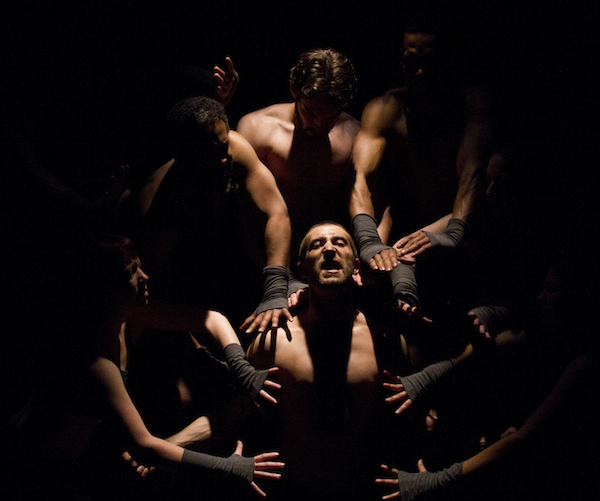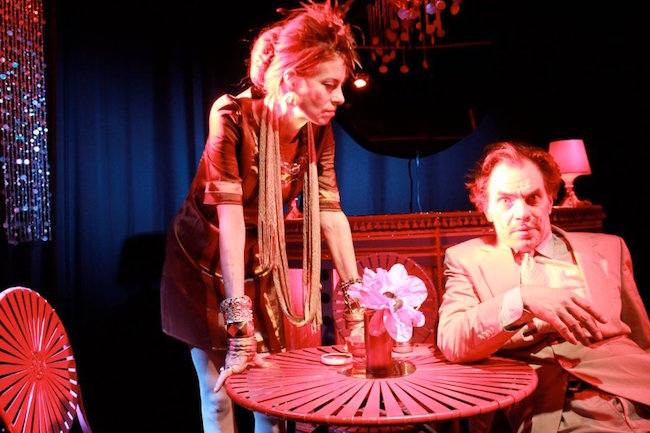Stage Feature: TW Festival’s David Kaplan on Beyond Success — Eugene O’Neill and Tennessee Williams
Once Eugene O’Neill and Tennessee Williams achieved success, they wanted to take on themes in their plays that challenged audiences.

A Russian production of Eugene O’Neill’s “The Hairy Ape” coming to the 11th Provincetown Tennessee Williams Festival. Photo: Dave Sarrafian.
By Robert Israel
David Kaplan is a stage director whose itchy feet routinely take him globetrotting to Asia, Africa, Europe, and Russia to work with such troupes as the National Theatre of Ghana and the Hong Kong Repertory Theatre on productions of plays by Tennessee Williams and Jean Genet, among others.
For the past eleven years Kaplan has also been the curator and impresario of the Provincetown Tennessee Williams Theater Festival. Each year he invites many of the theater companies he has worked with overseas to travel stateside to showcase their work.
This year, from September 22-25, troupes from South Africa and Russia will be in residence in Provincetown to present their interpretations of Williams’ plays, sharing makeshift stages — on wharves and in other venues peppered throughout the seaside village — with visiting homegrown companies from Vermont, Pennsylvania, Massachusetts, and New York. This year features an expansion of the Festival’s vision: along with Williams, there will be productions of works by America’s only Nobel laureate in theater, Eugene O’Neill.
“We’re calling the Festival ‘Beyond Success’ because it showcases works by both Williams and O’Neill that they wrote after they had already become successful playwrights, had won accolades, and had captured the attention and trust of audiences,” Kaplan explains.
The ghost of Eugene O’Neill looms large in Provincetown, where he lived and wrote in various rooming houses, barrooms, and in an Outer Cape Cod dune shack at Peaked Hill Bar, beginning in 1916 (he died in Boston in 1953). In Provincetown, he cranked out one acts – many of them revolving around the sea — later performed by a ragtag troupe known as the Provincetown Players. His work is not a stranger to the Festival. Six years ago, under Jef Hall-Flavin’s direction, the Festival staged a memorable al fresco production of O’Neill’s one-act play Diff’rent at the Boatslip Resort Hotel with Provincetown Harbor as the backdrop.
O’Neill’s influence over other American playwrights, including Williams (who summered in Provincetown twenty years after O’Neill lived there) has long been documented. But what hasn’t been explored is why both playwrights, whose stars were in the ascendant, chose during this phase of their careers to craft more experimental plays – with controversial themes — that catered less to the popular tastes of their contemporary audiences.
“O’Neill continued to experiment with less popular theatrical themes after he won the Pulitzer Prize in 1920 for Beyond the Horizon, with The Emperor Jones following a year later,” Kaplan observes, “and the same thing happened to Williams, who won wide acclaim (and the Pulitzer) in 1946 for A Streetcar Named Desire. They both looked at success skeptically. And they both looked with that same skeptical eye at the soullessness that was prevalent in American life. Now that they had achieved success, they wanted to embark on themes that challenged audiences.”
According to Kaplan, their mutual connection to Provincetown is also an aspect of their careers that will be reflected in the productions chosen for this year’s Festival.
“Both O’Neill and Williams hung out with artists in Provincetown who influenced their work by helping them to see how color could be added to their theatrical landscapes,” Kaplan notes. “These artists also rejected social trends and had grown to distrust America’s penchant toward success, money, and glibness that we find mirrored in both playwrights’ works.”

Regina Bartkoff and Charles Schick in a scene from a production of “In the Bar of a Tokyo Hotel” coming to the 11th Provincetown Tennessee Williams Festival. Photo: Romy Ashby.
Another contributing factor to the distrust both playwrights had toward success in the American theatrical marketplace was that they were both “outsiders,” Kaplan suggests.
“Williams was gay, and O’Neill, despite having a successful actor as a father, was an Irish-American coming of age in Yankee Connecticut,” Kaplan observes. “Neither playwright ever felt that they ‘fit in.’”
Kaplan is convinced that audiences who flock each year to Provincetown – and each year the productions are well attended – will find a connection to the challenges we are facing as a nation in the 21st century.
“Audiences have come to expect that our Festival takes risks, that we present works by Williams and others that show how they explored less popular themes,” Kaplan argues. “For both writers, they felt compelled to push the creative envelope. In Williams’ In the Bar of a Tokyo Hotel we hear a character say, ‘I’m terrified stepping into unknown territory, but I have to do it.’”
Kaplan feels today’s audiences — facing an election year where anger and distrust has overwhelmed reasonable discourse — will find the themes of displacement and a search for integrity and soulfulness compelling: “There are many themes in the works we are presenting by Williams and O’Neill that question our pursuit of success and the costs we pay for these pursuits.”
Robert Israel writes about theater, travel, and the arts, and is a member of Independent Reviewers of New England (IRNE). He can be reached at risrael_97@yahoo.com.
Tagged: Beyond Success, David Kaplan, Eugene O'Neill, Provincetown, Provincetown Tennessee Williams Theater Festival
